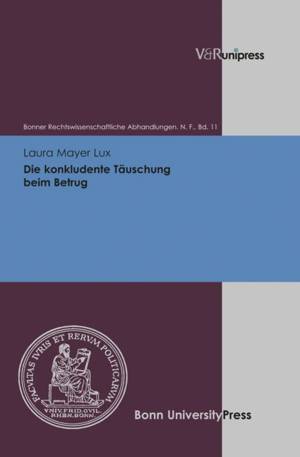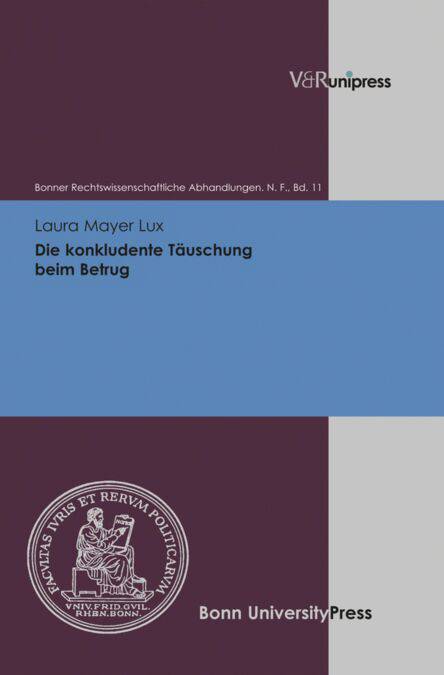
Onze Vivlio e-readers ondervinden momenteel synchronisatieproblemen. We doen er alles aan om dit zo snel mogelijk op te lossen. Onze excuses voor het ongemak!
- Afhalen na 1 uur in een winkel met voorraad
- Gratis thuislevering in België vanaf € 30
- Ruim aanbod met 7 miljoen producten
Onze Vivlio e-readers ondervinden momenteel synchronisatieproblemen. We doen er alles aan om dit zo snel mogelijk op te lossen. Onze excuses voor het ongemak!
- Afhalen na 1 uur in een winkel met voorraad
- Gratis thuislevering in België vanaf € 30
- Ruim aanbod met 7 miljoen producten
Zoeken
Omschrijving
Die meisten Definitionsversuche von konkludenter Täuschung kommen über Leerformeln – etwa die »Verkehrsauffassung« – nicht hinaus. Im Gegensatz dazu kann Laura Mayer Lux aufzeigen, dass die schlüssige Täuschung eine aktive Täuschung ist, die einer unwahren Behauptung über betrugsrelevante Tatsachen entspricht. Mithilfe der analytischen Sprachphilosophie begründet die Autorin Betrug als »Kommunikationsdelikt« theoretisch und bestimmt Täuschung mit Bezug auf die kommunikative Interaktion zwischen Täter und Getäuschtem. Vor diesem Hintergrund wird deutlich, dass die konkludente Täuschung als »semantischer Schluss« bezeichnet werden kann, also als ein Schluss, der im Hinblick auf die Bedeutung des fraglichen kommunikativen Aktes konstruiert wird, und als »indirekte unwahre Informationsbehauptung« verstanden werden muss.
This study seeks to contribute, through the analytical philosophy of language, to a theoretical framework of fraud as a "communication offense". It also aims at determining the meaning of the deceit element – particularly, implied or tacit deceit – with reference to the communicative interaction between the offender and the victim of the deception. A thorough study of definitions of tacit deceit reveals that most researches come out with "empty formulas" – such as "prevailing public understanding" – which are unable to specify the deceit element. By contrast, this study argues that tacit deceit should be referred to as an active deceit. That is, an untrue statement about fraud-relevant facts, i.e., information which, depending on the economic relationship, may act as a determining factor for a rational disposition of property. Finally, this research clarifies tacit deceit as a "semantic deduction", i.e., a deduction that is constructed in view of the meaning of the communicative act under analysis, and proposes that tacit deceit should be interpreted as an "indirect false assertion about information"
This study seeks to contribute, through the analytical philosophy of language, to a theoretical framework of fraud as a "communication offense". It also aims at determining the meaning of the deceit element – particularly, implied or tacit deceit – with reference to the communicative interaction between the offender and the victim of the deception. A thorough study of definitions of tacit deceit reveals that most researches come out with "empty formulas" – such as "prevailing public understanding" – which are unable to specify the deceit element. By contrast, this study argues that tacit deceit should be referred to as an active deceit. That is, an untrue statement about fraud-relevant facts, i.e., information which, depending on the economic relationship, may act as a determining factor for a rational disposition of property. Finally, this research clarifies tacit deceit as a "semantic deduction", i.e., a deduction that is constructed in view of the meaning of the communicative act under analysis, and proposes that tacit deceit should be interpreted as an "indirect false assertion about information"
Specificaties
Betrokkenen
- Auteur(s):
- Uitgeverij:
Inhoud
- Aantal bladzijden:
- 288
- Taal:
- Duits
- Reeks:
Eigenschappen
- Productcode (EAN):
- 9783847001157
- Verschijningsdatum:
- 23/04/2013
- Uitvoering:
- E-book
- Formaat:

Alleen bij Standaard Boekhandel
+ 65 punten op je klantenkaart van Standaard Boekhandel
Beoordelingen
We publiceren alleen reviews die voldoen aan de voorwaarden voor reviews. Bekijk onze voorwaarden voor reviews.











